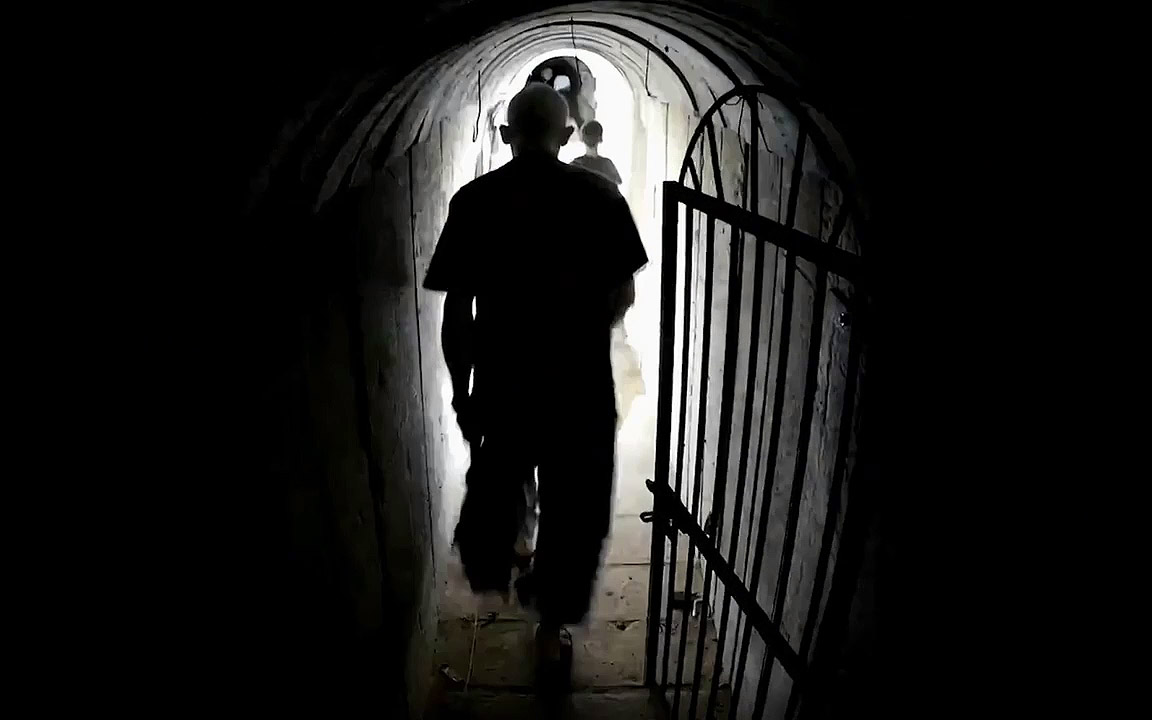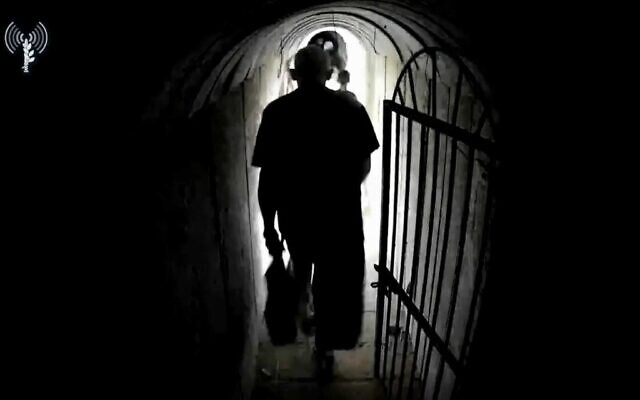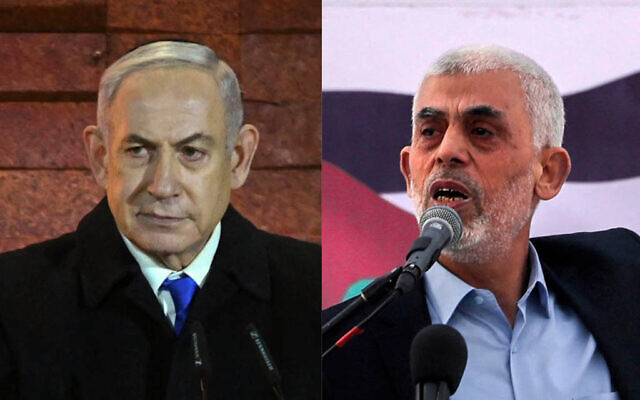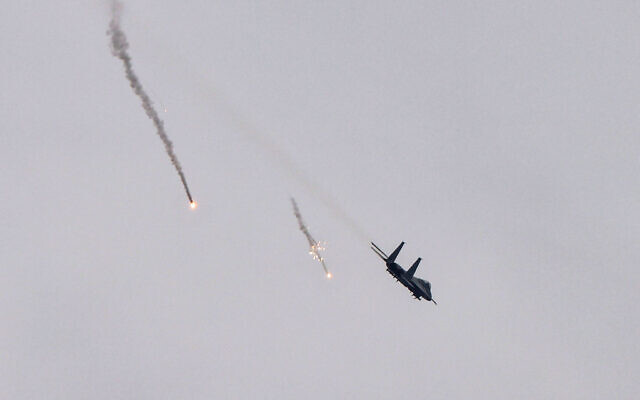



The Times of Israel is liveblogging Saturday’s events as they happen.
Fuming over report, Democratic senator warns it may fuel calls to further limit weapons to Israel

Progressive Democrats are fuming following the release of the State Department’s report accepting Israel’s assurances that it is using US weapons in accordance with international humanitarian law.
The report did find it “reasonable to assess that Israel has at times used US-supplied weapons in ways that were inconsistent with its obligations, but determined that the administration didn’t have enough information to verify those alleged breaches.
“This report contradicts itself,” Senator Chris Van Hollen of Maryland says in a briefing with reporters following the release of the report. Van Hollen has been one of the leading critics of Israel’s military campaign on Capitol Hill. Pressure applied by him and other Democrats is seen to have played a major role in US President Joe Biden’s decision to adopt a memo in February requiring all US security aid recipients to provide a written assurance that they’re using American weapons in accordance with international law.
That National Security Memo — known as NSM-20 — required the Biden administration to issue a report to Congress determining whether it accepts assurances from aid recipients that they are complying with international law, which the State Department did Friday right before the start of the weekend in an indication that it wanted the determination to be buried.
The memo ultimately was not used in the way Van Hollen and other progressives had hoped.
“It provides a useful accountability structure, but it will be most useful if judgments can be made based on the facts and the law and not driven by what we wish the facts and the law were,” Van Hollen continues. “They’re ducking a determination on the hard… politically inconvenient cases.”
“The report might create an atmosphere where people will push for more limitations on offensive weapons to Israel,” Van Hollen warns.
But given that Congress is split and a sizeable number of Democrats aren’t as critical of Israel’s military campaign as he is, it is less likely that such limitations will get very far on the Hill.
Sinwar not hiding in Rafah, officials tell ToI, as PM publicly prioritizes IDF op there

Hamas leader Yahya Sinwar is not hiding in Rafah, two officials familiar with the matter tell The Times of Israel, as the IDF moves to expand its operations in Gaza’s southernmost city.
Prime Minister Benjamin Netanyahu has elevated a potential IDF operation in Rafah to the top of his public agenda, but targeting Hamas’s leadership is believed to still be a major Israeli war aim as well.
Israel has had some success on this front, killing Hamas military wing deputy commander Marwan Issa — considered the terror group’s No. 3 leader in Gaza — along with other senior commanders in recent months. But Sinwar and his deputy — military wing chief Mohammed Deif — have remained elusive, despite repeated claims by Israeli officials that the IDF was closing in on them.
The two officials speaking to The Times of Israel were unable to say with certainty where Sinwar is currently located, but they cited recent intelligence assessments that placed the Hamas leader in underground tunnels in the Khan Younis area, some five miles north of Rafah.
An third official — an Israeli one — asserted that Sinwar is still in Gaza.
IDF ground forces began operating in Rafah on Monday, launching a targeted operation in the eastern part of the city aimed at taking over the Gaza side of the border crossing with Egypt. The security cabinet voted Thursday to approve a measured expansion of the Rafah operation in what is aimed at remaining within the scope of what Washington is willing to accept.
US President Joe Biden said he would stop sending certain offensive weapons to the IDF if Israel went forward with a major ground offensive in the population centers of the city where over one million Palestinians are sheltering. He already withheld a shipment of high payload bombs last week amid fears they’d be used in Rafah.

Netanyahu has pledged to launch a major offensive in Rafah for months, arguing that the operation is essential for defeating Hamas, which has four of its remaining six active battalions located in the city.
But one of the officials speaking to The Times of Israel said many Hamas fighters in Rafah have fled northward as Israeli threats of an invasion intensified in recent weeks.
While Israel says 18 of Hamas’s 24 battalions have been dismantled, the terror group’s fighters have managed to regroup and return to areas previously cleared by the IDF.
The IDF was operating in the Gaza City neighborhood of Zeitun this week for the third time since the war’s outbreak, with security officials warning that the IDF would be forced to continue playing this game of cat and mouse with Hamas until the Israeli government advances a viable alternative to Hamas rule.
While much of the security establishment would like to see the Palestinian Authority — or at least Palestinians linked to the PA — fill the vacuums that the IDF is briefly creating through its operations throughout the Strip; Netanyahu has rejected the idea outright, as his far-right allies have pushed for Israel to permanently occupy the Strip and re-establish settlements there.
Absent a diplomatic strategy to compliment the military operations, many of the IDF’s achievements on the ground have been short-lived, the Israeli official tells The Times of Israel.
Emirati FM rails at Netanyahu for suggesting UAE might help to manage Gaza after war

United Arab Emirates Foreign Minister Abdullah bin Zayed tears into Prime Minister Benjamin Netanyahu for suggesting that Abu Dhabi might assist local Palestinians in the management of Gaza after the war.
Netanyahu was asked in a Thursday interview with Dr. Phil who he’d like to see run Gaza after Hamas.
“We’ll probably have to have some kind of civilian administration by Gazans who are not committed to our destruction, possibly with the aid of the United Arab Emirates, Saudi Arabia and other countries that I think want to see stability and peace,” Netanyahu responded, while clarifying that Israel would maintain the right to enter Gaza as necessary to root out remnant terror elements.
Bin Zayed tweets the UAE’s denunciation of Netanyahu’s comments “calling on the state to participate in civil administration of the Gaza Strip, which is under Israeli occupation.”
“The UAE stresses that the Israeli prime minister does not have any legal capacity to take this step, and the state refuses to be drawn into any plan aimed at providing cover for the Israeli presence in the Gaza Strip,” he adds.
“The UAE affirms that when a Palestinian government is formed that meets the hopes and aspirations of the brotherly Palestinian people and enjoys integrity, competence and independence, the state will be fully prepared to provide all forms of support to that government,” Bin Zayed says.
Emirati leaders have repeatedly asserted that they will not take part in the post-war management of Gaza absent Israel commitment to create a pathway to a future two-state solution — a framework Netanyahu opposes.
Some officials have suggested that Abu Dhabi has privately shown more flexibility.
US President Joe Biden said Wednesday that five Arab countries “are prepared to help rebuild Gaza, prepared to help transition to a two-state solution… to maintain the security and peace while they’re working out a Palestinian Authority that’s real and not corrupt.”
Biden said he didn’t want to name. the five countries “because I don’t want to get them in trouble,” but he clearly appeared to be referring to the UAE, Saudi Arabia, the United Arab Emirates, Jordan, Egypt and Qatar.
Those five countries have established a forum in coordination with the US to craft a post-war vision for Gaza aimed at an eventual end to the Israeli-Palestinian conflict.
Biden report finds Israeli vows on lawful use of US arms credible, but ‘reasonable’ to assess otherwise

In a highly anticipated and somewhat convoluted report to Congress, the Biden administration says it finds Israel’s assurances credible and reliable that it will use US weapons in accordance with international humanitarian law, amid its ongoing war in Gaza against Hamas.
However, in the strongest such statement from Biden officials, the State Department report also says it’s “reasonable” to assess that Israel has used US-supplied weapons in instances that are “inconsistent” with its international humanitarian law obligations, but that it does not have complete information to verify that American weapons were used in specific actions that were alleged to be breaches of international humanitarian law.
The State Department was asked to deliver to Congress under a new National Security Memorandum (NSM) that US President Joe Biden issued in early February, whether it finds credible Israel’s assurances that its use of American weapons does not violate US or international law.
“Embassies Bogota, Baghdad, Jerusalem, Nairobi, Abuja, Mogadishu, and Kyiv obtained the required assurances signed by the designated representatives of their respective countries, which were in turn reviewed by the State Department in order to determine credibility and reliability by March 24, 2024,” the State Department writes.
“While in some countries there have been circumstances over the reporting period that raise serious concerns, the USG currently assesses the assurances provided by each recipient country to be credible and reliable so as to allow the provision of defense articles covered under NSM-20 to continue,” the report states.
It notes, however: “Israel has not shared complete information to verify whether US defense articles covered under NSM-20 were specifically used in actions that have been alleged as violations of IHL or IHRL in Gaza, or in the West Bank and East Jerusalem during the period of the report.”
And it adds: “Nevertheless, given Israel’s significant reliance on US-made defense articles, it is reasonable to assess that defense articles covered under NSM-20 have been used by Israeli security forces since October 7 in instances inconsistent with its IHL obligations or with established best practices for mitigating civilian harm.”
